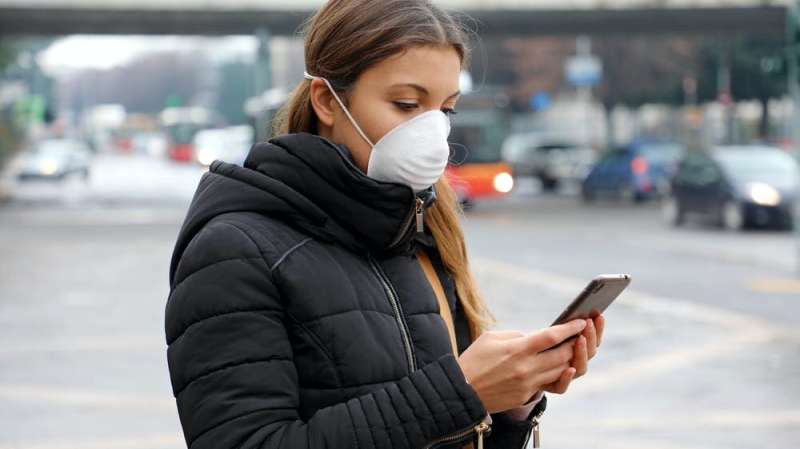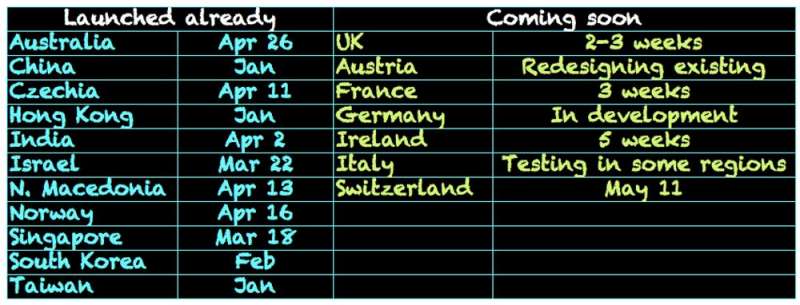Contact tracing apps: What they should learn from fitness trackers

Contact tracing has long been used in response to disease outbreaks. It is simply the idea of asking an infected person who they have been in contact with and then notifying the people in question to try and control the spread of the disease. Some countries have been employing this during the current crisis. The World Health Organisation has consistently said that "tracing every contact must be the backbone of the response in every country."
Governments around the world are also either deploying or developing digital versions of contact tracing, using smartphones and Bluetooth to keep track of who an infected person has encountered. South Korea was one of the first, and its BlueTrace scheme is seen as one key reason why its infection rates have stayed under control. France, Germany, the UK and the Netherlands are among those that are now creating apps of their own.
We are also seeing international efforts to build secure standards that will preserve users' privacy and allow these systems to talk to one another. This includes the Swiss-led DP-3T project and a joint effort by Google and Apple.
Digital difficulties
Digital contact tracing is certainly not perfect. Users will need a smartphone capable of running the Bluetooth Low Energy system. The Financial Times reckons that around 2 billion phones won't be compatible. Worse, digital contact tracing can only help where the people interacting are both using the system.
Researchers calculate that around 56% of the population would need to use an app for it to be successful—that's four in five smartphone users. Yet many people have reasonable privacy concerns around how their data will be used, and they worry this could become permanent. In Australia, for example, the government has struggled to convince even its own MPs that its proposed app will be private enough.
In the UK, recent survey data provides room for cautious optimism: 65% of people agree with using smartphones for contact tracing. Among 55-75 year olds, support is nearing 73%, while for 18-34 year-olds it is 59%. Whether this will be impacted by the UK's likely decision to build a centralized database of contact events remains to be seen.
Even then, there is another major issue. Not everyone agrees that digital contact tracing is effective against diseases—or how well it will work against COVID-19, where a long time can pass before people show symptoms and get tested. Widespread testing will still be needed, and digital contact tracing won't prevent everyone from being infected.

Nudge, nudge
So even as more countries' apps go live, social distancing will continue to be the main way for people to protect themselves for the time being. The UK guidance asks people to stay more than two metres away from those they encounter outside, and to avoid non-essential public transport journeys and other social gatherings.
Maintaining such restrictions will be a challenge as lockdowns are lifted, since social distancing goes against human instinct. One piece of research also found that an essential factor in people being willing to social distance was if they thought they could do it; the longer people are expected to stick to the coronavirus guidelines, the more they will probably feel they can't keep doing it.
The research shows that people don't necessarily social distance, despite their best intentions. In the words of Chris Whitty, the UK chief medical adviser, "enthusiasm at some point lags." Contact tracing apps will help here, but there is a way of making them more effective that seems to have been overlooked.
These apps work by storing the Bluetooth identifier being transmitted from every phone they encounter. The received signal strength will also be stored to give a rough approximation of distance, though this varies between phones so isn't hugely accurate.
On a regular basis, the app will fetch the identifiers of all people in the country who have tested positive for COVID-19 or are at very high risk of having been infected. It will then check back and see if its user has previously encountered any of these identifiers, and trigger a warning message or phone call that tells the user to get tested or take other steps. This will be people's only guide to how well they are successfully social-distancing—apart from developing symptoms.
To make this better, we could add a feature that works in a similar way to how fitness tracking apps give feedback on a person's daily performance to "nudge" them into doing a little better tomorrow. Apps could tell users how many people they are coming into contact with each day as a whole, and what kind of risk profile that gives them—comparing them with other users without giving any private information away. The data could also differentiate between long and short encounters. Users could then track their efforts at distancing in real time.
Changing behavior
There is evidence that this kind of feedback-driven approach helps to change people's behavior, and can improve their health. We also know that peer comparison is very effective. In one example, the NHS monitored how many antibiotics GPs were prescribing and sent letters telling them if they were prescribing a lot more than their peers. The NHS project cost £4,000 (compared to an alternative incentive scheme that would have cost an estimated £23 million) and cut antibiotics prescriptions by over 3%.
We're already seeing nudging being used to change people's behavior in other ways in relation to COVID-19, such as the NHS sending warnings to vulnerable people to self-isolate for 12 weeks, along with simple instructions to help them do it.
Contact tracing apps present an opportunity to introduce these insights into distancing, without needing any new data collection or sharing. This feels like a relatively easy win that governments should seriously consider while many of these apps are still in the planning and design stages.
This article is republished from The Conversation under a Creative Commons license. Read the original article.![]()





















